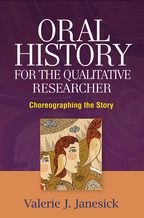Oral History for the Qualitative Researcher
Choreographing the Story
Valerie J. Janesick
Reinventing Oral History for the Qualitative Researcher
*Introduction
*Oral History Evolving and a Work in Progress
*Mnemosyne, Goddess of Memory
*Why Oral History Now?
*Sorting Out Oral Traditions
*Perspectives
*Oral History as a Social Justice Project
*On the Critical Importance of Testimony as Oral History
*Summary
II. Design and Tension
The Tools of the Oral Historian: The Choreography of Techniques and Issues
*Introduction
*Interviewing as a Creative Act of the Imagination
*Oral History Interviewing
*Types of Interview Questions
*Preparing Questions
*About Phone Interviews
*Some Interviewing Rules of Thumb from the Interviewer's Point of View
*Perennial Ethical Issues for the Interviewer
*Analyzing and Interpreting Oral History Interview Data
*Journal Writing for the Oral Historian and for the Narrator
*Documents as Data
*Documents, Artifacts, and Photographs to Augment Oral History Reports
*Summary
III. Balance and Composition
Becoming an Oral Historian
*Introduction
*Writing Up the Narrative
*The Researcher's Reflexive Journal
*Using Poetry in Oral History to Represent Someone's Story
*The Potential and Eloquence of the Narrative in Digital Storytelling
*Internet Inquiry, the Wiki World, and Copyleft Agreements for Oral Historians and Qualitative Researchers
*Finding Models of Digital Oral History Using Tools of the Web
*Awareness of Ethical and Legal Issues
*Putting Some Pieces Together: Crafting an Oral History Report
*Summary
IV. Harmony
The Art of Making Sense of Oral History Projects with a Choreography of Social Justice
*Introduction
*Why I Do Oral History
*Hawkins's Theory of Dance, Experience, and Art
*Final Reflections
Appendices:
A. Selected Electronic Resources: Websites and Listservs for the Oral Historian
B. Selected Oral History Centers, Archives, and Collections
C. Selected Journals That Publish Oral Histories and Related Issues
D. Sample Consent Form for Project Undergoing IRB Review
E. Basic Contract (Sample)
F. Federal Statement on Oral History
G. Statement on IRBs from the American Historical Association (Edited)
H. List of Choreographers Used for Surnames of Participants
I. Practicing the Techniques of Oral History: Strategies and Activities to Sharpen Your Writing Skills
J. Excerpt from an Oral History of a 9/11 firefighter
K. Excerpt from an Oral History of Hurricane Katrina Survivors
L. Example of a Nonparticipant Observation Assignment to Develop Observation Skills
M. A Sample Rubric Assessing Writing
N. Interview Project Assignment
O. Example of a Qualitative Research Methods Syllabus
P. An Excerpt of a Transcript (Edited) from an Interview with Jane A. de Mille
Q. Digital Equipment for the Oral Historian



